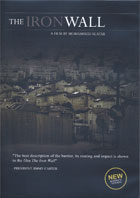
The Iron Wall 2006
Distributed by Palestineans for Peace and Democracy, PO Box 759, Stafford, TX 77497-0759
Produced by Palestinian Agricultural Relief Committees (PARC); Executive Producer Sawsan Qaoud
Directed by Mohammed Alatar
DVD, color, 52 min.
Jr. High - Adult
Human Rights, Political Studies, Middle East, Multiculturalism and Diversity Studies, Palestine, Israel, Sociology, Nationalism
Date Entered: 05/20/2011
Reviewed by Malcolm L. Rigsby, Department of Sociology, Ouachita Baptist University, Arkadelphia, ARTouted by many as a barrier and by others as a security measure, the wall and fence that now runs throughout much of the land commonly called The West Bank, Palestine, and by some “Israel,” carries with it much political, social, cultural connotation. Jimmy Carter, in his controversial book Palestine, Peace Not Apartheid, defines this documentary as the best source available for anyone wanting a “description of the barrier, its routing and impact” on the people of Palestine and Israel. In 1949, the armistice defined a “green line” setting out a land to the Palestinian indigenous population. Since that date and primarily since the 1967 war, settlement of the West Bank by Israelis has escalated. This settlement operation has brought much dismay and hurt to the Palestinian people. This film argues among other things that the potential of a contiguous Palestinian state has been thwarted by vigorous settlement construction, other outposts, and the construction of the wall of separation, called by some, a device of apartheid.
The documentary relies heavily on interviews from a cross-section of individuals and spokespersons associated with various peace and political organizations. It presents what began as a sectarian Zionist movement, has been transformed into a secular political colonization effort with design to expel the native population from the West Bank and make the region part of the state of Israel. In this analysis, the director, Mohammed Alatar, must be commended in his effort to present a political and social issue in a way that allows the viewer to consider the multiple parties involved in this issue. Watch for his balanced portrayal of Palestinians, secular Israeli settlers, and religious Zionist settlers. Small groups may find this a point of departure for introducing discussion of political, religious, as well as economic reasons for expansion of the state of Israel into the West Bank. One critical question asked in this film is; whether a wall of separation can ever bring peace? Americans may wish to discuss the concept of “separate, but equal” theory and the failure of this policy in American relations.
As you journey through this documentary, you will find historical and political analysis and cultural undertone creating the connection for both the Israeli and the Palestinian to this region of the world. Perhaps it will provide an inroad for each viewer to better understand the feelings of the people of this land and their underlying feelings about their identities. Perhaps this film’s greatest contribution is to promote the viewer’s ability to understand and connect with a people’s basic need to protect what they believe is indivisible.
Filming, both audio and video is well done. Editing must be commended in helping to bring the many interviews into context with the graphs, maps, and other footage.